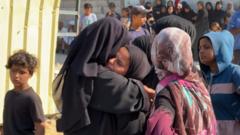As part of their efforts to alleviate suffering in the region, Jordanian and Emirati aircraft dropped 25 tonnes of supplies on Sunday. This comes after Israel announced a "tactical pause" on military operations for 10 hours each day, designed to facilitate the passage of aid and counter accusations of deliberate starvation. Despite this, reports indicate further casualties, including nine killed and many injured due to Israeli fire near aid routes. Meanwhile, vast crowds gathered in Gaza as food supplies dwindled, highlighting the dire need for ongoing assistance.
Jordan and UAE Launch Aid Drops Amid Israeli 'Tactical Pause'

Jordan and UAE Launch Aid Drops Amid Israeli 'Tactical Pause'
Jordan and the UAE have commenced humanitarian aid deliveries in Gaza, coinciding with a temporary ceasefire declared by Israel to address the escalating humanitarian crisis.
With pressure mounting on Israel to permit humanitarian support, local residents expressed cautious optimism about the aid drops, fearing the temporary measures may not resolve the crisis. Amid these developments, international leaders have called for more robust action, emphasizing the critical situation faced by Palestinians as they navigate through ongoing conflict.
The situation remains precarious, with ongoing violence complicating humanitarian efforts, as local aid workers emphasize the need for sustainable routes to support the beleaguered population effectively. Meanwhile, Israeli officials assert that the new measures will allow aid to reach those in need while maintaining a focus on military objectives.
As the humanitarian response unfolds, the urgency for lasting solutions to the crisis becomes increasingly apparent, leaving millions in Gaza under extreme distress and uncertainty.
Jordan's military said Sunday it worked with the UAE to deliver 25 tonnes of aid in three aerial drops amid an Israeli "tactical pause" aimed at alleviating the humanitarian crisis in Gaza. The Israeli government temporarily halted military operations for 10 hours daily to facilitate aid corridors, aimed at combating allegations of systematic starvation. However, medics report nine people were killed and 54 injured by Israeli fire near aid convoys in central Gaza, with continuous air strikes impacting residential areas. An airstrike occurred an hour after the announced pause, raising concerns over the effectiveness and safety of the declared truce.
Additionally, the UN warns of famine-like conditions among the Gazan population, with reported mass starvation as a third of the two million residents lack sufficient food access. Meanwhile, frontline healthcare workers strain under the increased number of malnutrition cases and further casualties arising from desperate attempts to secure food. Local families express a mixture of hopeful anticipation for international aid with trepidation over its lack of permanence. Observers continue to urge for more sustainable aid routes and proactive measures to alleviate the humanitarian crisis in Gaza, calling for systematic changes to ensure the safety and well-being of those affected.
The situation remains precarious, with ongoing violence complicating humanitarian efforts, as local aid workers emphasize the need for sustainable routes to support the beleaguered population effectively. Meanwhile, Israeli officials assert that the new measures will allow aid to reach those in need while maintaining a focus on military objectives.
As the humanitarian response unfolds, the urgency for lasting solutions to the crisis becomes increasingly apparent, leaving millions in Gaza under extreme distress and uncertainty.
Jordan's military said Sunday it worked with the UAE to deliver 25 tonnes of aid in three aerial drops amid an Israeli "tactical pause" aimed at alleviating the humanitarian crisis in Gaza. The Israeli government temporarily halted military operations for 10 hours daily to facilitate aid corridors, aimed at combating allegations of systematic starvation. However, medics report nine people were killed and 54 injured by Israeli fire near aid convoys in central Gaza, with continuous air strikes impacting residential areas. An airstrike occurred an hour after the announced pause, raising concerns over the effectiveness and safety of the declared truce.
Additionally, the UN warns of famine-like conditions among the Gazan population, with reported mass starvation as a third of the two million residents lack sufficient food access. Meanwhile, frontline healthcare workers strain under the increased number of malnutrition cases and further casualties arising from desperate attempts to secure food. Local families express a mixture of hopeful anticipation for international aid with trepidation over its lack of permanence. Observers continue to urge for more sustainable aid routes and proactive measures to alleviate the humanitarian crisis in Gaza, calling for systematic changes to ensure the safety and well-being of those affected.



















